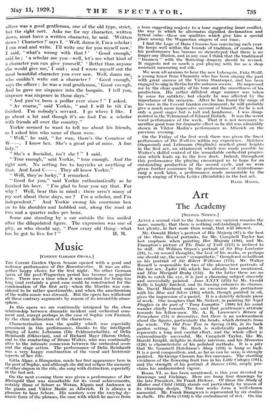Music
[COVENT GARDEN OPERA.] Tine Covent Garden Opera Season opened with a good and Welcome performance of Der Rosenkavalier. It was an alto- gether happy choice for the first night. No other German opera of the post-Wagnerian period has become so popular here. There was a time when it was criticized for being too long (and certainly a good case could be constructed for the condensation of the first act)—when the libretto was con- sidered to be rather questionable, and when the anachronism of the waltz music was stressed. But the opera has withstood all these contrary arguments by reason of its irresistible atmo- sphere.
In this opera we are continually intrigued by the close relationship between dramatic incident and orchestral com- ment and, except perhaps in the case of Sophie von Faninal, by the clear delineation of the characters.
Characterization was the quality which was especially prominent in this performance, thanks to the intelligent singing of Lotte Lehmann (Die Feldmarschallin), of Delia Reinhardt (Oktavian), and of Richard Mayr (Baron Ochs), and to the conducting of Bruno Walter, who was continually alive to the intimate connexion between the orchestral score and the stage action. The performance of Delia Reinhardt was a very happy combination of the vocal and histrionic aspects of her role.
Gitta Alpar, a Hungarian, made her first appearance here in the part of Sophie, and although she did not eclipse the memory of other singers in the role, she sang with distinction, especially in the last act.
On the next evening there was given a performance of Der Rheingold that was remarkable for its vocal achievements, notably those of Schorr as Wotan, Kipnis and Andresen as the giants and Viktor Aladin. as Alberich. It is always a pleasure to hear Schorr. His mastery over the varying dy- namic force of the phrases, the ease with which he moves from
a tone suggesting majesty to a tone• inner conflict,
the way in which he alternates dign' declamation and lyrical calm—these are qualities which give him a special place among the Wagnerian singers of our time.
I find the Loge of Hans Clemens less convincing each year. He keeps well within the bounds of tradition, of course, but his performance has become so stereotyped that there is no longer any illusion, and in any case I think that the traditional " business " with the fluttering drapery should be revised. It suggests not so much a god playing with fire as a shop assistant measuring red silk.
We were all anxious to hear the new Lohengrin, Fritz Wolff, a young tenor from Chemnitz who has been singing the part with great success at the Vienna Staatsoper, and has been engaged to sing in Berlin for the autumn season. He impressed me by the clear quality of his tone and the smoothness of his production. His rather diffident stage manner was taken by some for subtlety, but clearly he was affected by the importance of the occasion. After he has found the range of his voice in the Covent Garden environment, he will probably give a much more impressive account of himself, for he is not only a good singer but is tall and handsome. I was disap- pointed in the Telramund of Eduard Habich. It was the worst vocal performance of the week. That it is not necessary to sacrifice good tone for dramatic effect as he did was admirably shown in Viktor Madin's performance as Alberich on the previous evening.
On the Friday of the first week there was given the finest performance of Die Waikiire within my experience. Melchior (Siegmund) and Lehmann (Sieglinde) reached great heights in the first act, an attainment which was made possible by Walter's skilful control of the remarkable orchestral progres- sion which leads up to the love duet. Indeed, throughout this performance the playing encouraged us to hope for an outstanding production of the second cycle, and we were given further assurance by the performance of Gotterdamme- rung a week later, a performance made memorable by the superb singing of Frida Leider (Briinhilde) in the last act.
BASIL MAINE.










































 Previous page
Previous page